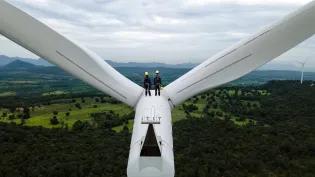Their expertise has informed an action plan to reduce fossil fuel dependency without damaging communities that currently rely on the industry.
In partnership with a team from the Tavistock Institute for Human Relations, Edinburgh experts have developed a world-leading monitoring and evaluation framework for the so-called just transition in Scotland.
The researchers drew up the strategy with an independent advisory body that is lobbying the Scottish Government to set equitable transition targets.
The Just Transition Commission has warned that Scotland risks ‘going backwards’ in its efforts to protect vulnerable workers and communities unless goals are fixed.
Commission members, who worked with experts in the University’s School of Social and Political Science, recently met First Minister John Swinney to make their case.
The Commission has called for groundbreaking policy innovation, urging the Scottish Government to establish world-first quantifiable targets that ensure economic change benefits everyone.
Setting targets
Commission co-chair Professor Dave Reay, of the University of Edinburgh’s School of GeoSciences, says: ''Quantifying exactly what we mean by just transition and setting targets for what we want to achieve can catalyse action across government, business and industry and help unlock investment.
''It would also represent a genuine world-first at a time when societies around the globe are grappling with how to do this.''
The Commission’s annual report and the monitoring and evaluation work lead by the social science experts reveals a critical challenge – how to prevent workers from being left behind as industries evolve towards a low-carbon future.
The report highlights the complexity of measuring social and economic fairness during massive industrial shifts, emphasising that what gets measured ultimately gets addressed.
Key recommendations include developing precise interim targets aligned with carbon budgets, to prevent job market disruptions that could force skilled workers to seek opportunities elsewhere.
Managed transition
Communities across Scotland – from Grangemouth to Shetland – stand to gain or lose significantly depending on how this transition is managed, the report cautions.
It warns against a passive, market-driven approach that could see Scotland capturing only a minimal portion of the potential economic benefits from climate transformation.
Innovative proposals include giving communities a statutory right to shared ownership of renewable energy projects, coupled with essential financial and technical support mechanisms.
A national event planned for October 2025 will bring together senior leaders from government, industry, trade unions, and community groups to debate these critical challenges.
The Commission’s message, backed by the research, is unequivocal – Scotland must act decisively and strategically to ensure no community or worker is left behind in the journey towards a sustainable economic future.
While acknowledging existing delays in climate policy development, the report remains optimistic that a robust legacy can still be achieved through forward-thinking leadership.
Related links
School of Social and Political Science
Image credit: Tunvarat Pruksachat/Getty


